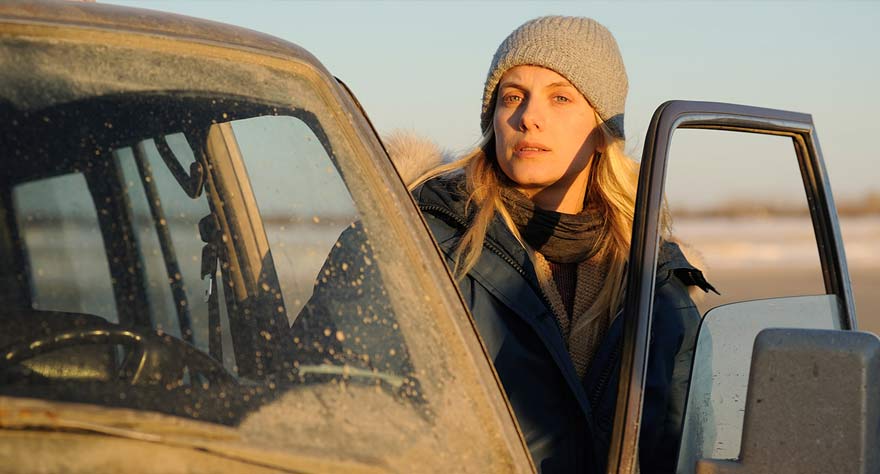
A mother-son dynamic is explored in this vaguely fantastical but ultimately hole-riddled film.

A mother-son dynamic is explored in this vaguely fantastical but ultimately hole-riddled film.
Falconry, icy tundras, mystical healers, and a mother and son estranged. Claudia Llosa’s third film sounds on paper like a Narnian fantasy. It’s not actually, but watching the film is to play a guessing game of sorts. Within the first few minutes I was sure the film was meant to be dystopian. That might explain Jennifer Connelly’s rat-tail and why the entire film is set in an icy cold winter. But the film’s time period is never really established, which is fine for mystery’s sake, but the film makes a habit of offering only the peaks and no explanatory valleys. Its characters are seen only in their misery, pain, or exaggerated moments with very little buffer between to fill in the gaps of knowledge surrounding their personalities and circumstances. Llosa’s idea of filler seems to be beautiful icy and dreamlike shots that add to the dystopian fantasy, but not to the story.
Told within dual storylines set in an enigmatic future and an enigmatic past, Jennifer Connelly plays Nana, a mother of two boys, the younger of which has incurable cancer. In its opening scenes Nana travels with her sons, Gully and Ivan, to seek “The Healer” (William Shimell) a mystical man who has a cult-like following and hundreds of visitors all seeking healing for themselves and loved ones. Upon arriving at his healing shack, made of intertwined sticks, all of the people seeking healing are given wrapped pebbles. The one with the white one gets to be seen by the healer. Nana doesn’t get it, but she watches as the child of another family enters the stick shack. Ivan, who carries with him a pet falcon, lets his bird fly free. But the falcon gets itself trapped in the stick shack and accidentally destroys it. Nana’s attempt to help only gets her shunned by the livid parents whose healing has been interrupted and incomplete. Desperate for a ride home for her family, she agrees to force her son to leave the falcon behind. A livid father decides that’s not good enough and shoots the bird as it flies off. All a very somber start to the grimness waiting in the rest of the film.
Cut to the “future” where Ivan (Cillian Murphy) is grown, still a falconer, and has a wife and son of his own. A documentarian, Jannia (Mélanie Laurent), comes to interview him but is gruffly shot down when she starts asking questions about Ivan’s mother. His curiosity gets the better of him later, and when he gets Jannia to admit she’s seeking out the current location of his mother he decides to join her to travel to the Arctic circle where’s she’s last been spotted. Meanwhile, back in the past the Healer, Newman, reveals to Nana that the boy whose healing she interrupted with the falcon incident is now cured, and since he never touched the boy, he’s deduced she must have been the one to heal him. A bit of a slap in the face considering her cancer-stricken son. But she’s haunted by the possibility, and starts to seek him out to explore what this could mean. Unfortunately we’re not shown a lot about her investigation or acceptance of her role as a healer, with very few questions around this very mystical side of the film answered.
Connelly plays stony maternal to great effect. She’s by far the most mesmerizing aspect of the film. The moments we get with her and Ivan as mother and son are great, but never steeped in much warmth. Her eventual abandonment of Ivan feels unwarranted, but is just one of several contrived plot points meant to lead to the second storyline. The only relationship that attempts emotion is weirdly between Ivan and Jannia, but doesn’t add up as we don’t know enough about why Ivan has become the man he is and because Jannia is a relative mystery until the very end when her hidden motivations are revealed (and unfortunately not at all surprising).
The snowy landscape, the fanciful falconry (a unique occupational choice that is, surprise surprise, given no backstory), and the sparkling eyes of both Murphy and Connelly do much to allure and create a sense of purpose to the film. But the gaping holes in the film’s story, clearly meant to entice and add mystery, only serve as frustrating barriers in fully connecting with what could be a gorgeous follow-up to Llosa’s Academy Award nominated film The Milk of Sorrow.
Originally published as part of our 2015 Tribeca Film Festival coverage